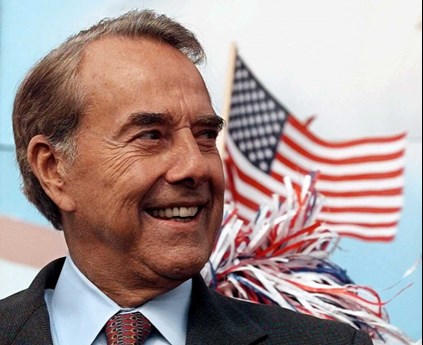Brunswick Partner Craig Mullaney and Senator Bob Dole, both veterans of the US Army’s legendary 10th Mountain Division, share stories and reflect on leadership.
On April 26, I entered the Washington offices of law firm Alston & Bird to meet Robert Dole, the former long-time majority leader of the US Senate and 1996 Republican presidential nominee. At 96, Senator Dole serves as a Special Counsel to Alston & Bird.
In my hand, I carried a plaque commissioned for Senator Dole. It was not a commemoration of his accomplishments over 27 years in the Senate. Nothing about the plaque was partisan. While Senator Dole is a lifelong Republican, I served as a policy advisor during the presidential campaign and administration of Democrat Barack Obama.
I designed the plaque to honor Mr. Dole’s service to an institution that transcends politics—the US Army, and in particular its legendary 10th Mountain Division. We both served as 10th Mountain rifle platoon leaders 58 years apart, Lieutenant Dole during World War II and Lieutenant Mullaney in Afghanistan. Only days before Germany’s surrender, Lieutenant Dole was shot in the back and arm leading an assault against Italy’s Gothic Line north of Florence. His wounds hospitalized him for more than 39 months and left Senator Dole partially disabled. Formerly a star athlete, he dropped from 193 to 122 pounds. While I was fortunate to escape physical injury during my tour, our unit saw significant combat action in the mountains of Afghanistan.
In Senator Dole’s office, I found the Washington legend sitting behind a desk in a wheelchair that the Senator says he’s striving to render unnecessary. “In just the last six months my legs have really strengthened. I can almost get up alone,” said Senator Dole. “So, I’m encouraged.” At 96, his energy and optimism are tangible.
In presenting the plaque, I recounted to Senator Dole the place of honor his name and unit continue to hold in the 10th Mountain Division. Their stories were told widely in our unit before we deployed to Afghanistan in 2003. Riva Ridge. Mount Belvedere. The roads at Fort Drum in upstate New York carry the names of battles fought by Senator Dole and his generation of mountain infantry. Our weapons, adversaries and battlefields may have been different, but we both wore the 10th Mountain patch on our sleeve—two crossed swords emblazoned on a powder keg.
I handed to Senator Dole one of the combat patches I’d worn under fire. Notwithstanding our 56-year age gap, we began to talk about the shared experience of assuming leadership of older and more experienced soldiers.
“Like you, I took command of a platoon that had already seen quite a bit of action,” I said. “I was a green lieutenant with a lot of book smarts.”
“Me too,” Senator Dole said. His aspirations to become a doctor were interrupted when he left the University of Kansas to volunteer for the Army.
“I didn’t know the first thing about how to actually lead a group of men, many of whom were older than me, into harm’s way,” I confessed.
“These guys under me had been in combat and I hadn’t,” said Senator Dole. From reading his memoir, One Soldier’s Story, I knew that he’d replaced another lieutenant killed in action. When he arrived at the platoon, the senior noncommissioned officer handed him the dead lieutenant’s binoculars and map.


